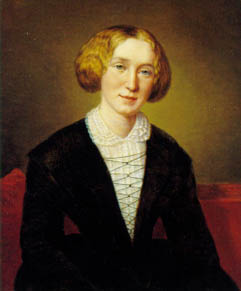Mr Gilfil's Love Story
In 1893, Tchaikovsky considered writing operas based on two of the stories from the collection Scenes of Clerical Life (1857) by the English writer Mary Ann Evans (1819-1880), published under her literary pseudonym of "George Eliot". The second of these subjects was Mr Gilfil's Love Story (Любовь Мистера Гильфиля) (TH 245 ; ČW 464) [1].
Modest Tchaikovsky recalled that after first considering The Sad Fortunes of the Reverend Amos Barton (the first story in the trilogy) as an opera subject, the composer changed his mind in favour of Mr Gilfil's Love Story [2]. Herman Laroche also remembered that "During the current summer [of 1893], amongst other things, he had read a French translation of the Scenes of Clerical Life by George Eliot, for whose novels, beginning with The Mill on the Floss, he had an extremely strong affection during the last years of his life. Among the stories which make up this book was Mr Gilfil's Love Story, the action of which takes place in the eighteenth century, and whose pathos particularly captivated him. He found that this subject 'should be well-suited for writing an opera'" [3].
After Tchaikovsky's death, a brief scenario for Acts II and III of an opera on Mr Gilfil's Love Story was discovered amongst his papers [4]:
Act II, Scene 1 — various scenes: 1) between the Captain and his fiancée; 2) between Tina and the Captain; 3) between Tina, the fiancée, the Captain and Gilfil, out of which is explained their relationships to each other, Tina's jealousy, the fiancée's jealousy, the truth of the captain's situation, everyone's worsening health, Tina's rudeness, the challenge of her explanation from the Lord, her decision to leave him for Gilfil, Gilfil's suffering and jealousy, etc. All of this should take place in the park.
Scene 2 — Evening in the large hall of the castle. Tina is asked to sing. She sings the second aria from the first act, but so enchantingly that all are amazed (something similar to Adrienne Lecouvreur), and the Captain is seized and unexpectedly picks up a dagger and leaps at her, but just in time she runs. The Captain lets out a cry, and dies. General terror and despair. Tina falls in a faint.
Act III — Tina is taking refuge at Dorcas's house, in a miserable state. Gilfil appears, happy to have found her, and commiserates with her situation. His attempts to talk with her are unsuccessful. Gilfil, after his earlier short scenes, explains how everything has come about, a tortured reminder of her first aria. She listens and begins to sing and then cries, taking hold of herself, and all ends almost happily, but with a hint of melancholy. She does not become engaged to Gilfil, but leaves him with the hope that she will love him. [5].
No other documents relating to the opera have come to light.
External Links
- Wikipedia
- Wikisource (complete text)
Notes and References
- ↑ As "Mr. Gilfil's Lovestory" in ČW.
- ↑ See Жизнь Петра Ильича Чайковского, том 3 (1902), p. 633.
- ↑ Herman Laroche, Несколько слов о Петре Ильиче Чайковском (1893).
- ↑ Klin House-Museum Archive (a2, No. 29.
- ↑ Quoted from The Tchaikovsky Handbook. A guide to the man and his music, vol. 1 (2002), p. 421.

